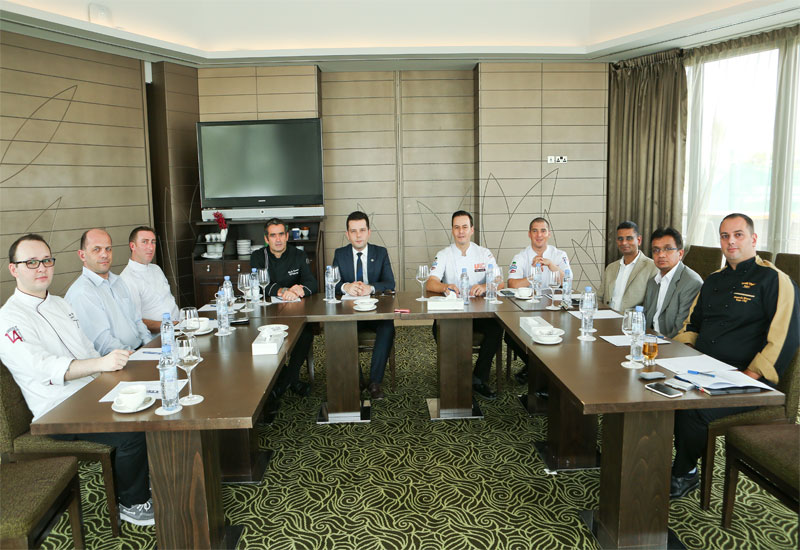Meet the experts
- Muhammad Khalid Saeed, food health inspection officer, Dubai Municipality
- Sascha Triemer vice president — culinary, Atlantis, The Palm
- Jéan Van Der Westhuizen executive chef — Middle East, Pakistan, Sri Lanka, Unilever Food Solutions
- Sunjeh Raja director and CEO, International Centre for Culinary Arts (ICCA)
- Marc Hayes executive chef Arabia, Unilever Food Solutions
- Evangelos Karakoulias F&B manager, DoubleTree by Hilton Dubai — Jumeirah Beach.
- Jason Pettit brand chef, the noodle house, Jumeirah Restaurants LLC
- Jay Williams executive sous chef, Westin and Le Méridien Mina Seyahi
- Collin Kaskel chef de cuisine, West 14th Restaurant, Oceana Beach Resort
- Antonello Manca executive chef, Dusit Thani Dubai
In association with Unilever Food Solutions, Caterer Middle East rounded up the experts to discuss supply chain issues, and how to better improve the relationship between operators, distributors and manufacturers
One of the most important aspects of a kitchen is the quality of the ingredients that come through the door. The supply chain has multiple layers, where it goes from the manufacturer to supplier and then finally to the chefs.

| Advertisement |
Caterer Middle East and Unilever Food Solutions meets the experts to find out what are the specific issues faced during “goods in”, whether there are any solutions, and how the industry can improve overall standards.
What are the concerns you have, if any, surrounding receiving products?
Jéan Van Der Westhuizen, executive chef — Middle East, Pakistan, Sri Lanka, Unilever Food Solutions: What we want to talk about is the full chain, so from those that manufacture the product, what are we putting in place with distributors to make sure you receive the product in a safe manner.
Because obviously the consequences of not receiving it, or contaminating it, or having issues with the product could be devastating not only for your reputations but ours as well.
If you wanted to start it from the source where we manufacture, you could ask, are we doing enough to audit the distributors to make sure we get a product of the highest quality? The hard work that we do in manufacturing those products, that all goes out of the window if we don’t audit distributors.
Sascha Triemer, vice president culinary, Atlantis, The Palm: I think the training starts really from the source. First of all, if you’re in Dubai, you mainly have distributors — you don’t have the suppliers from the source except a few local ones because most of the products come from overseas.
Any new supplier or distributor we hire, we audit before they can be registered and every six months that has to be carried out again. And then the biggest critical point is the receiving, when it comes in and is accepted.
The training for the procurement team is critical for the entire operation. There’s a checklist in place where they can tick it off and physically check it; we have spot checks by the health and safety department to verify that that process has been done.
Jay Williams, executive sous chef, Westin and Le Méridien Mina Seyahi: We had a chef who is rostered in there for six hours every day with the receiving department. So they can learn from the chef and then if we have new products coming into the hotel we will actually train the receiving guys on what that product is, we’ll show it to them and we cook it for them and they taste it, because if they know what it is, they will have a bit more passion about their job.
Evangelos Karakoulias, F&B manager, DoubleTree by Hilton Dubai — Jumeirah Beach: Sometimes they get overloaded, and they really can’t cope with the numbers. Within half an hour they get everyone coming at the same time, and there’s the challenge.
People would keep the long checklist on the side and just receive the products, some of them will skip it. This is why we introduced random audits from the kitchen, and from other departments there would be a quality audit. Receiving clerks usually belong to the financing department, like general purchasing, and we want them to be trained exactly how the chefs are trained.
Article continues on next page ...









 Search our database of more than 2,700 industry companies
Search our database of more than 2,700 industry companies









